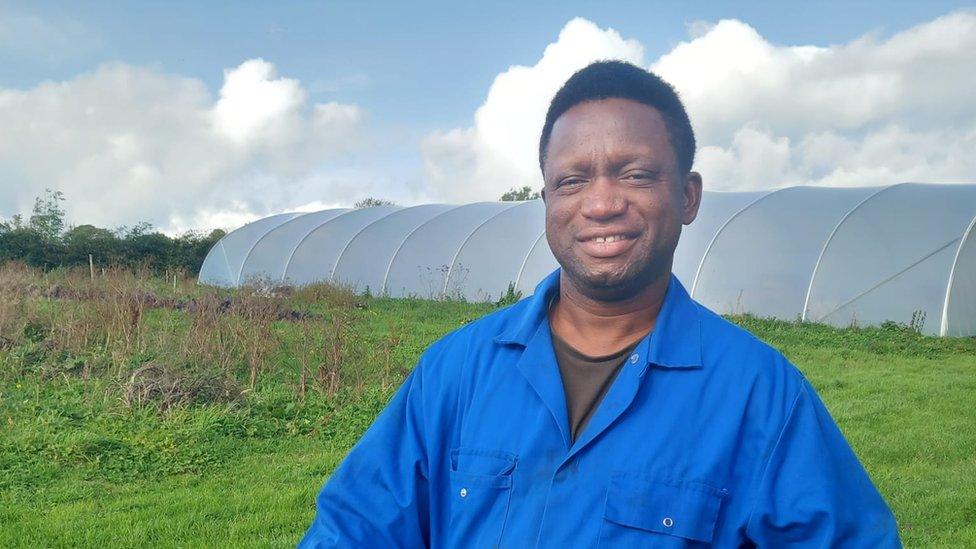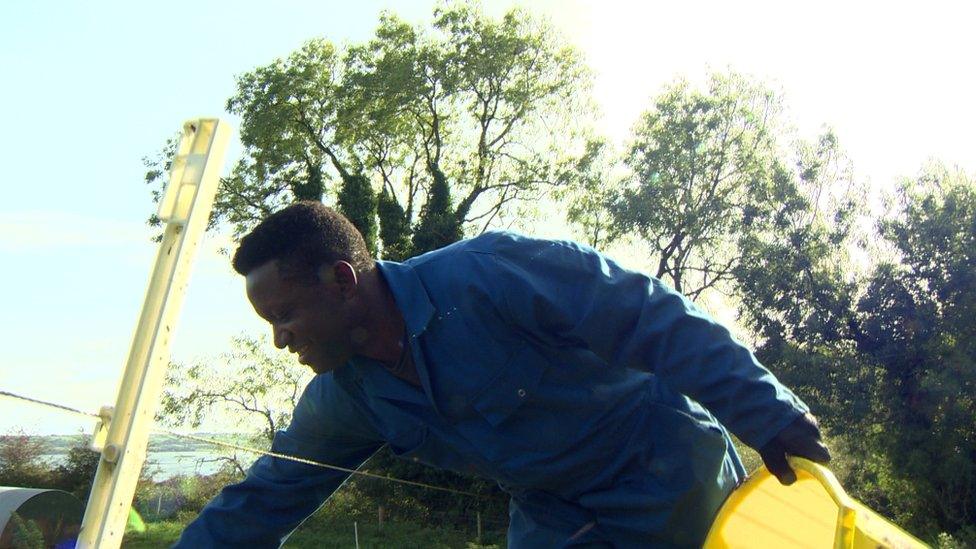Farm volunteering project gives asylum seeker 'new hope'
- Published

"Connecting with the animals and the plants makes you understand that life has value"
'Bringing sunshine' - that's what Sunny Oyem's name means in his native language Ukwuani. And while sunshine isn't always on the forecast for Larne, the sun seems to come out when Sunny arrives at Jubilee Farm.
Every Tuesday, without fail he finds himself here, covered in mud and feeding a drove of hungry pigs.
A far cry from his job in financial services back in Nigeria. Yet, Sunny - who has come to Northern Ireland seeking asylum - couldn't be happier.
Jubilee Farm, situated on the Glynn River just outside Larne, County Antrim, is Northern Ireland's first community-owned farm.
Once a week, it hosts a number of asylum seekers and refugees who are keen to get their hands dirty. Each day typically starts with a cup of tea and a chat, before the wellingtons go on and the volunteers head out to feed the animals, harvest the crops and maintain the land.
Less than a year ago, Sunny, 40, made the long journey from his home in Lagos to Northern Ireland.
He faced persecution and a personal threat to his life after he was subjected to police brutality and ransom as a result of his personal circumstances.
He was forced to leave his family, friends and old life behind him.
"I went through a lot. I had a breakdown mentally," he said.
"I was in a very dark place."
'New hope for my future'
He lives in asylum accommodation, a hotel in Carrickfergus, and when he first arrived in Northern Ireland his days were mostly spent in and around the hotel.
According to Law Centre NI, asylum seekers are generally not allowed to work - they can only take a job if they have been waiting 12 months or more for a decision on their application or if they find a job listed on the 'Shortage Occupation List'.
However most jobs on the list are skilled specialisms, like engineering, architecture and veterinary science. A Law Centre NI report indicates that it has, to date, proved almost impossible for asylum seekers to find suitable work here.
Since starting with the project on Jubilee Farm, Sunny has gained the confidence to get involved in other volunteering programmes, helping out at the local food bank and cooperative.
"Jubilee Farm has given me a new hope for my future, and a new life," he said.
"Here, I have found my peace and my stability.
"This is where I can feel at home."

Feeding the pigs is Sunny's favourite task on the farm
Sustainability and the conservation of native biodiversity is at the heart of Jubilee Farm's ethos.
Portia Woods, marketing manager at the farm, said community projects on the farm always "seek to provide the chance for animals, biodiversity, the soil and our volunteers to flourish".
She added: "We have enjoyed providing activities that connect people with farming and conservation, alongside wellbeing, in a diverse green space."
There is a range of mindfulness workshops, which volunteers can get involved with, such as meditation, breathwork classes, grief counselling and simply listening to the dawn chorus.
'Helped me appreciate life'
Sunny attributes much of his happiness here to being involved with and surrounded by nature.
"Jubilee Farm has changed my life in a dramatic way. I have found my new passion in farming.
"Connecting with nature, the animals and the plants gives you a good perspective on life. It makes you understand that life has value, and that life is to be appreciated.
"Coming to Jubilee Farm has helped me to appreciate and give value to life."
'Dignity and purpose'
Patrick Corrigan, Amnesty International UK's Northern Ireland director, said schemes like those at the farm are "a great opportunity for asylum seekers to show what they can do to make a real positive difference, for society and for themselves".
"This is a fantastic example, not only of how much people seeking asylum are able to contribute to the community if given a chance, but the huge importance of the right to work to an individual's sense of dignity and purpose."